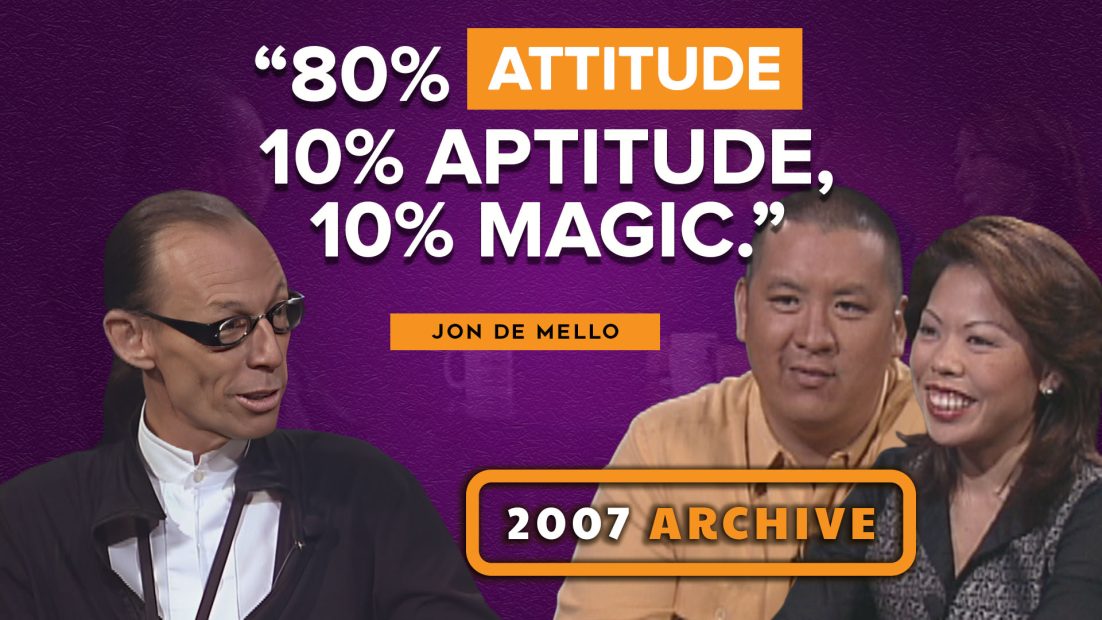Jon de Mello: The Business Genius Who Changed Hawaiian Music Forever
Hawaiian music has touched hearts worldwide, from the soothing melodies of the ukulele to the deep cultural storytelling embedded in its lyrics. But behind its global reach stands a visionary who shaped the industry like no other—Jon de Mello. A producer, composer, businessman, and creative force, de Mello’s work at Mountain Apple Company transformed not just Hawaiian music, but how the world experiences it. His passion for artistry, business acumen, and commitment to elevating local talent made him a true pioneer.
In this archive episode of Greater Good Radio, Jon de Mello sat down with hosts Evan Leong and Kari Leong to discuss his journey, his philosophy on success, and his enduring impact on the music world.
A Legacy Rooted in Creativity and Business
Born into a world of music and art, Jon de Mello was destined for creative greatness. His father, composer Jack de Mello, played a significant role in shaping his early exposure to the arts. Jon took that foundation and built something extraordinary—an empire that not only produced music but also managed talent, designed album art, and handled distribution, licensing, and publishing.
One of the most pivotal moments in his career came when a Mountain Apple dropped onto his tin roof, inspiring the name of his now-iconic company. Since its founding in 1974, Mountain Apple Company became a powerhouse, representing some of the biggest names in Hawaiian music, including The Brothers Cazimero and Israel “IZ” Kamakawiwoʻole.
The Magic Behind His Success
Jon de Mello believed that talent alone wasn’t enough to make an artist successful. He famously broke success down into three key elements:
- 80% Attitude – The drive, discipline, and resilience to succeed
- 10% Aptitude – The skill and talent necessary to perform
- 10% Magic – The intangible spark that sets artists apart
His approach wasn’t just about making music—it was about crafting an experience. He worked closely with artists to refine their image, sound, and presence. His production style was unique, often recording musicians live in the studio to capture authentic energy rather than layering tracks individually. This approach, though old-school, was deeply effective in maintaining the organic beauty of Hawaiian music.
The Israel “IZ” Kamakawiwoʻole Phenomenon
Perhaps Jon de Mello’s most famous contribution to the world was his work with Israel “IZ” Kamakawiwoʻole. The album Facing Future, released in 1993, became the best-selling Hawaiian album of all time. The hauntingly beautiful rendition of Over the Rainbow, produced under de Mello’s direction, catapulted Hawaiian music to global recognition.
This was no accident. De Mello had an innate ability to recognize the magic in an artist and nurture it into something extraordinary. He shared a personal story of receiving a call from IZ at 2:30 AM, where the legendary musician was sobbing with gratitude for how Jon had changed his life. That moment solidified the deep bond between artist and producer—a relationship built on trust, passion, and a shared love for Hawaiian culture.
Bridging Business and Art
Unlike many artists, Jon de Mello was just as comfortable in boardrooms as he was in recording studios. His ability to balance creativity with business made Mountain Apple Company the strongest independent Hawaiian record label in history. By 2005, three out of five Grammy nominees for Hawaiian music were under his label.
His business savvy extended beyond music—he learned from some of the most powerful business figures in Hawaii, absorbing lessons in finance, management, and deal-making. This mentorship, coupled with his artistic instincts, allowed him to create a sustainable business that preserved and promoted Hawaiian music globally.
A Commitment to Giving Back
For de Mello, success wasn’t just about personal achievement—it was about community. From an early age, he believed in giving back, whether by donating music, designing concert stages for fundraisers, or mentoring young artists. He saw the music industry as more than just entertainment; it was a way to foster culture, connection, and healing.
One of his most impactful projects was a collaboration with The Nature Conservancy, where he spearheaded the creation of an educational DVD featuring rare Hawaiian bird species and native landscapes. The project, which took two and a half years, was a testament to his deep love for Hawaii and his belief that music and media could be tools for positive change.
The Future of Hawaiian Music and His Lasting Influence
Jon de Mello’s work ensured that Hawaiian music would not only survive but thrive on the world stage. His innovative spirit, combined with an unwavering respect for tradition, helped bridge the gap between local culture and global audiences.
Even with decades of achievements under his belt, he remained humble, always looking toward the next challenge. When asked about his greatest accomplishment, he simply said: “I don’t think I’ve done it yet.”
His legacy, however, tells a different story. Through his relentless passion, sharp business sense, and dedication to his artists, Jon de Mello didn’t just change Hawaiian music—he ensured it would be heard and cherished for generations to come.
CLICK HERE to SUBSCRIBE to our YouTube channel
Podcast: Play in new window | Download
Subscribe: Apple Podcasts | Spotify | RSS

